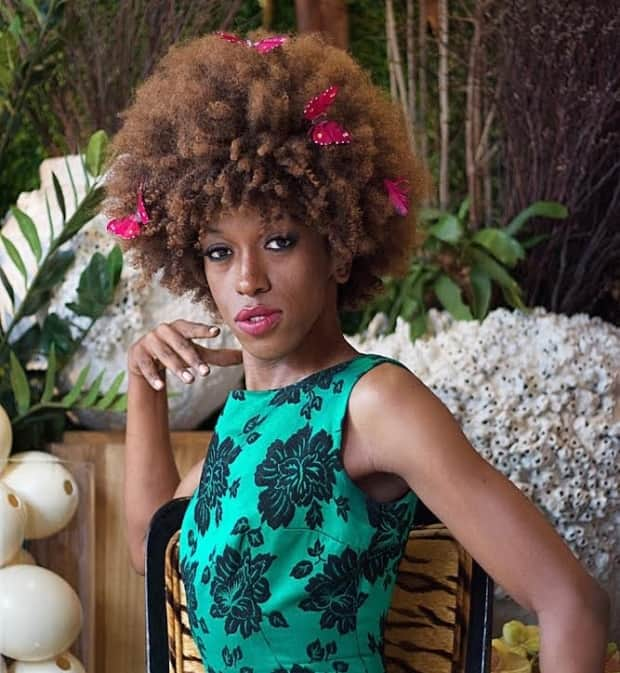Black transgender women using social media to celebrate, advocate and connect

In one of the first TikTok videos Kissy Duerré posted of herself, she was combing out her afro-textured hair to a trending song.
The content creator from Saskatoon was just trying to pass the time during the pandemic.
However, when the Black Lives Matter movement ramped up following the murder of George Floyd last summer, Duerré wanted to showcase transgender issues, particularly those facing people of colour.
"That's when I realized there was this lacking of representation of Black transgender women," Duerré said.
She created a video discussing the intersection of being transgender, Black and a woman within the Black Lives Matter and LGBTQ movements.
While Black transgender women have often been at the forefront of these movements, they remain some of the most diminished.
Duerré's open discussion on transmisogynoir — the dislike or prejudice of transgender women of colour — got the attention of many on TikTok, so she started posting more videos advocating for transgender people in a fun, lighthearted way — with some sass peppered in.
"I think it's very important for society to get to know [the issues], be exposed to that and get comfortable with it," Duerré said of her videos.
Social media, which can be a breeding ground for internet trolls and racism, has become a better platform for advocacy during the pandemic, especially for marginalized voices.
TikTok and Instagram can play a role in reclaiming space because they have few barriers to entry, said MelVee X, a board member with The Colour Factor in Calgary, an organization that provides spaces of healing for the BIPOC community.
"If you don't see yourself, you can put yourself out there with social media and you can create your own spaces," X said.
Social media can also be a place to learn and address gaps in services, institutional issues and struggles.
"The mainstream media still has so many biases and so much work to do. But if you don't see yourself represented in that, if you're not interested in fighting the system, you can create your own channels of sharing and information," X said.
"It can really be a way that we reclaim ourselves and our identities."
Visibility in social spaces "matters in so many ways," said Biko Beauttah, an Instragram influencer and Black transgender woman based in Toronto, but especially for transgender women of colour, who are some of the most marginalized.
"Social media is a very powerful tool that blessed all of our lives in the sense that it has given everybody a chance to create a platform for yourself independent of traditional media, or people who would otherwise probably not allow or give you your own space."

In 2006, Beauttah moved to Canada as a refugee from Kenya because of the lack of protections for, and injustices against, LGBTQ people there.
When she arrived in Toronto, she lived in a refugee shelter for six months. Eventually, she became a community leader and founded Trans Workforce, the world's first career and networking symposium for transgender people.
"It wasn't safe to be out in the world, but online visibility makes us find each other and it doesn't make you feel alone if you're a trans teen in a small community or in your parents' basement," Beauttah said.
"Suicide is really high among trans teens, but when you see you're not alone and there's others like you, this visibility can save lives."

While the community of Black trans women on TikTok is small, it's well-connected, allowing women to find support and see others who look just like them. It can also open a window to a world full of allies.
"I did not have that privilege growing up," Duerré said. "And I always thought how nice it would have been to see someone like me, just living their lives, being unapologetically themselves. I think that's the most beautiful thing."
Duerré has also received endless messages from fans. They say things like: "You gave me the courage to love who I am, you gave me the courage to come out to my parents, you gave me the courage to wake up this morning," she said.
"Those are very simple words, but they mean a lot to me. They show that what I am doing, what I am creating, does have an impact on people and we need that."
She eventually amassed over 600,000 fans and nearly 18 million likes. Earlier this year, she was selected as one of TikTok's Black Trailblazers.

Both Duerré and Beauttah plan on using TikTok and Instagram to continue advocating for Black transgender women while educating others. Beauttah compares it to a relay in which she took the baton from transgender rights trailblazers like California's Tracie Jada O'Brien, whose work largely focuses on transgender health; Gay Liberation Front and Street Transvestite Action Revolutionaries founders Marsha P. Johnson and Sylvia Rivera from New York City; and Miss Major, who has done work fighting for Black transgender women's rights in the United States, especially within the justice system.
"These women of colour fought so me and my generation could have these freedoms we see today," Beauttah said.
"I'm doing my job to fight for my community and it's going to be your turn to take this baton and continue the journey. Others marched so I could walk, but it's your turn to pick it up and run to the finish line."
For more stories about the experiences of Black Canadians — from anti-Black racism to success stories within the Black community — check out Being Black in Canada, a CBC project Black Canadians can be proud of. You can read more stories here.


 Yahoo Finance
Yahoo Finance 